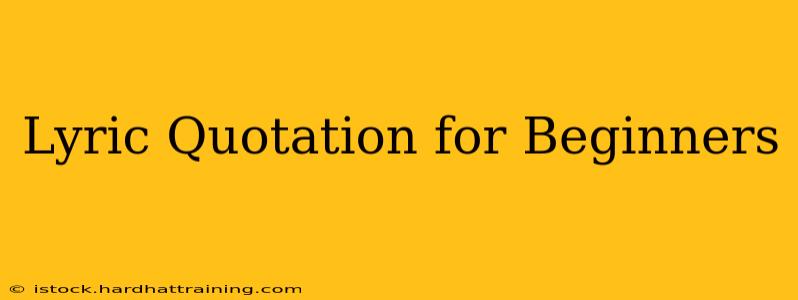Lyric quotation, the art of accurately and effectively citing song lyrics in academic or creative writing, might seem daunting at first. However, with a structured approach and understanding of the nuances involved, it becomes a manageable and even enriching skill. This guide will equip beginners with the necessary tools and knowledge to confidently quote lyrics in their work.
What is Lyric Quotation?
Lyric quotation is the process of incorporating song lyrics into your writing, properly attributed to the songwriter and artist. Unlike casual conversation, academic and formal writing requires precise citation to avoid plagiarism and to give credit where it's due. This includes not just mentioning the song title and artist but also providing context and appropriately formatting the quotation.
Why Quote Lyrics?
Quoting song lyrics can significantly enhance your writing in several ways:
- Supporting Arguments: Lyrics can provide powerful evidence or examples to support your points, particularly in analyses of culture, social commentary, or literary devices.
- Adding Depth and Nuance: A well-chosen lyric can add emotional weight, evoke a specific atmosphere, or illustrate a complex idea more effectively than mere prose.
- Enhancing Creativity: In creative writing, lyric quotations can introduce unique voices, create intriguing juxtapositions, or spark imaginative interpretations.
- Demonstrating Musical Knowledge: Quoting lyrics showcases your understanding of music and its impact on society and culture.
How to Quote Lyrics Correctly
Here's a step-by-step guide to mastering lyric quotation:
1. Accurate Transcription:
Ensure the lyrics are transcribed precisely. Even minor errors can misrepresent the meaning. Utilize reputable lyric websites (always cross-referencing for accuracy) or official songbooks. If the lyrics are unclear or disputed, note this in your citation.
2. Contextualization:
Never drop a lyric quotation into your text without providing context. Explain the significance of the quote, its relevance to your argument, and how it relates to the surrounding text.
3. Proper Citation:
Follow a consistent citation style (MLA, APA, Chicago, etc.). Include the following information in your citation:
- Artist's Name: The performer or band.
- Song Title: In quotation marks.
- Album Title: (If relevant, and especially for academic papers)
- Year of Release:
- Record Label: (Optional, but useful for ensuring specificity)
Example (MLA):
"(Line 1) (Line 2)" (Artist Name, Song Title, Album Title, Year).
4. Formatting:
Follow your chosen style guide for formatting quotations. Short quotations are usually integrated into the sentence. Longer quotations (generally four lines or more) are typically set off as block quotations, indented from the left margin.
5. Ellipses and Brackets:
Use ellipses (...) to indicate omitted words from the original lyric. Use brackets [ ] to add clarifying words or to indicate alterations for grammatical coherence.
Addressing Common Questions:
How do I cite lyrics from a live performance?
For live performances, include details such as the venue and date if known. Specify "live performance" in your citation.
What if the lyrics are easily accessible online? Do I still need to cite them?
Yes! Even if the lyrics are readily available, proper attribution is crucial to avoid plagiarism. Always cite your sources.
Are there specific style guidelines for lyric quotation?
While there isn't a universally accepted separate style for lyric quotation, most style guides (MLA, APA, Chicago) adapt to accommodate it. The key is consistency and clarity.
How do I quote lyrics that contain profanity or sensitive language?
In academic settings, consider whether the profanity is integral to your analysis. You may choose to quote it directly, using a note to explain why, or use more tactful alternatives within square brackets. In creative writing, your approach will depend on the overall tone and style of your work.
By following these guidelines, beginners can confidently and effectively incorporate lyric quotations into their writing, enriching their work and demonstrating a keen understanding of both music and effective writing practices. Remember that accuracy, context, and proper citation are paramount.
